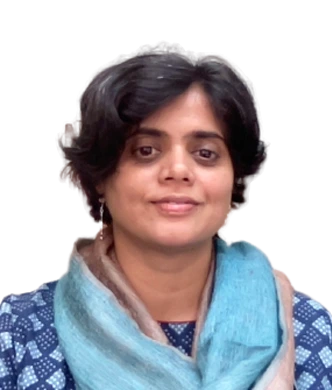
Shivali Tukdeo
Professor
shivali.tukdeo@mahindrauniversity.edu.in
Prof. Shivali Tukdeo’s current research interests include education policy, education and urban transformations, institutional studies, and global educational reforms. Her preoccupations, especially over the past few years, include new policy regimes in education, large-scale transformations in India and their connections with education, and residential schools for the disadvantaged.
PhD
- PhD: Education Policy Studies, University of Illinois, Urbana Champaign
M.Phil
- M.Phil: Applied Linguistics. University of Hyderabad
M.A
- M.A: Deccan College Post Graduate and Research Institute, Pune
B.A
- B.A.: University of Pune
No Data
Books:
2019
- Tukdeo, S. (2019) India Goes to School: Education Policy and Cultural Politics. Springer: New Delhi
Select Research Papers
2021
- Tukdeo, S. and Mali, A. (2021) Urban Dislocations and the Politics of Access: Metro Colonies, Bengaluru. Education and the Urban in India. Vol. 14.Max Weber Stiftung. DOI 10.25360/01-2021- 00008
- Peters, M. A., Means, A. J., Ericson, D. P., Tukdeo, S., Bradley, J. P., Jackson, L., Mu, G. M., Luke, T.W., & Misiaszek, G. W. (2021). The China-Threat Discourse, trade, and the future of Asia. A symposium. Educational Philosophy and Theory, 1–21. https://doi.org/10.1080/00131857.2021.1897573
2020
- Rizvi, F., Peters, M. A., Zembylas, M., Tukdeo, S., Mason, M., de Souza, L. M., Chengbing, W., Soudien, C., Lingard, B., Tarc, P., Tarc, A., Hughes, C., Bamberger, A., Zipin, L., & Rud, A. G. (2020). The long read: On the global relevance of the US elections. Educational Philosophy and Theory, 1–20. https://doi.org/10.1080/00131857.2020.1824784
2019
- Tukdeo, S., Mali, A. and Kosambi, R. (2019) Spaces of Learning and Growth: A Review of Ashram Schools in Maharashtra. NIAS
- Salam, J., Kurup, A., and Tukdeo, S. (2019) Historical Developments, Policy Turns and Emerging Concerns in Vocational and Higher Education in India. NIAS
2018
- Tukdeo, S. (2018) Beyond Deaths in Schools: Education, Knowledge Production and Adivasi Experience. Qualitative Research Journal, Vol. 18 No. 2, pp. 180-189.
2015
- Tukdeo, S. (2015) Class Divided: Global Pressures, Domestic Pulls and a Fractured Education Policy in India. In Policy Futures in Education.Vol 13 (2): 205-218
- Tukdeo, S. and Babu, S. (2015) Teaching and Teachable Moments in the New Regime. Economic and Political Weekly. Vol. L. No. 2.
2014
- Tukdeo, S. (2014) The Not-so-Hidden Power of Mobility and Education: Indian Diaspora, Knowledge Industries and the Development Imperatives. Journal of Diaspora Studies. Vol.7 (1)56-70.
2012
- Tukdeo, S. (2012) Teacher Education in India. In Encyclopedia of International Education. (Eds. D. Ness and Chia-Ling Lin) New York: M.E. Sharp Inc.
- Veerabhadranaika, P., Kumaran, R.S., Tukdeo, S., Vasavi, A.R., (2012) ‘The Education Question’ from the Perspective of Adivasis: Conditions, Policies, and Structures. Bangalore: NIAS Report.
Book Chapters
2015
- Tukdeo, S. (2015) Literacies and Power: Looking for Adivasi Voice in Education. In Kumar, A.K; Rustagi, P. and Subrahmanian, R. (Eds.) India’s Children: Essays in Social Policy. New Delhi: Oxford University Press.
2010
- Tukdeo, S. (2010) The Power of P2P: Information Networks, Social Organizing and Educational Futures. In Peters and Britez (eds.) Open Education and Education for Openness. Boston, MA: Sense Publishing.
2009
- Peters, M. and Tukdeo, S. (2009) Cultural Exchange, Study Abroad and Discourse of the Other. In Marginson, Murphy and Peters (eds) Global Creation: Space, Mobility and Synchrony in the Age of Knowledge Economy. New York: Peter Lang Publishing.
2007
- Tukdeo, S. (2007). Mapping Resistance: Coca-Cola and the Struggle in Plachimada, India. In J. Harris (ed.), Alternative Globalizations (291-305). Chicago: Change Maker Publications.
Opinion Pieces
2021
- Tukdeo, S., Singai, C. and Aiswarya T. (2021) New guidelines aim to make engineering education more inclusive – but may perpetuate inequalities. Scroll. https://scroll.in/article/990996/new-guidelines-aim-to-make-engineering-education-more-inclusive-but-may-perpetuate-inequalities
2020
- Tukdeo, S. (2020) Re-centering our Public Schools: Education in Times of Covid-19. https://thebastion.co.in/politics-and/education/education-in-times-of-covid-re-centering-our-public- schools/
2018
- Kosambi, R., Mali, A., Tukdeo, S. (2018) Ashram School Sanhita: Need for a New Perspective. Sadhana, vol. 30: 15-23
2016
- Tukdeo, S. (2016) Fifty Years of Kothari Commission Report. Countercurrents https://countercurrents.org/2016/08/50-years-of-kothari-commission-report/
2014
- Tukdeo, S. (2014) Towards a Rational Literacy: Education and Beyond. Kafila. https://kafila.online/tag/shivali-tukdeo/
- Tukdeo, S. (2014) The Language of Choice. Indian Express. https://indianexpress.com/article/opinion/columns/the-language-of-choice/
Book Reviews
2014
- Tukdeo, S. (2014) Complexity, Institutions and Public Policy. In Current Science. Vol. 196. No.7. Pp.1014-1015.
2013
- Tukdeo, S. (2013) Universities at the Crossroads: In Contributions to Indian Sociology. Vol. 47 pp327- 330.
2011
- Tukdeo, S. (2011) Education for Sustainable Development: Challenges, Strategies and Practices in a Globalized World. In Current Science. Vol. 98. No. 25.
2008
- Tukdeo, S. (2008) The Crisis of Elementary Education in India (Kumar, 2006). In Educational Studies. Vol. (44:2) pp. 167-170.
Shivali Tukdeo’s book, India Goes to School: Education Policy and Cultural Politics (2019) pays attention to the production and circulation of educational policy ideas in India as it investigates the shifts in overall educational goals. Tracing the policy positions from 19th century, my work looks at politics as well as governing of educational ideas, revisiting some of the long-standing debates on educational reforms, nationalism, social justice and development.
Prof. Tukdeo has also spent considerable time researching Ashram schools (residential schools) in Maharashtra. As institutions, Ashram schools go back to early twentieth century and connect with alternative traditions of education. After independence as mass education became a priority, Ashram schools became important spaces for access and social mobility for the disadvantaged populations.
Her more recent work is part of an international, inter-institutional research collaboration focusing on education and urban processes. As part of this collaboration, a series of working papers have been published and an edited book is forthcoming. https://perspectivia.net/receive/pnet_mods_00001041









